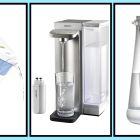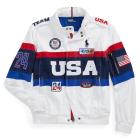
Water quality (or the lack thereof) has been making headlines a lot lately. A study just released in January 2024 found significantly higher levels of nanoplastics than expected in bottled water. Another recent (July 2023) study found PFAS (aka "forever chemicals") in many public drinking water systems nationwide. So it's understandable if you're feeling worried and confused about how to find safe, clean drinking water.
There are plenty of water filtration products available, but not all of them are fully transparent about which contaminants they can remove from water. Things get even trickier with microplastics and PFAS. Since research into these substances is relatively new, only a handful of water filters have been tested for their ability to remove them.
To help you cut through all the misleading and confusing marketing claims around water filters, we've rounded up products that have gone through independent, third-party testing to verify that they can, in fact, remove microplastics and forever chemicals.
While you can have a whole house water filtration system or under-sink system professionally installed, we've opted for the more more budget-friendly and easily accessible countertop systems and water filter pitchers. No installation required, just pop in the filter and pour in the tap water to have clean drinking water to fill your reusable water bottle.
The best countertop water filters and water filter pitchers
If your fridge doesn't come with a drinking water filter (make sure you're changing that filter when your filter's alert says it's time), you can get your own stand-alone option starting at $35. Options range from budget-minded picks like the Pur water filter pitcher to more expensive countertop water filters, like the Brita Hub. These options have all been independently tested to verify that they meet NSF standards and deliver clean water to keep you hydrated.
Best countertop water filtration system overall: Brita Hub

Brita's top-of-the-line stand-alone countertop water filtration system earns 4.2 stars on Amazon, with good reason. Independent testing confirmed this machine removes 99.9% of microplastics as small as 0.5 microns. That means you're not just getting rid of the larger pieces, but many of the smaller-sized nanoplastics. Testing also confirmed that it filtered out between 95% and 98% of PFOA and PFOS (PFAS chemicals).
You can find the full performance report on the Brita Hub filter here.
That powerful, certified filtration is housed in a convenient countertop machine that dispenses the filtered water directly into your cup or water bottle.
It's easy to refill the reservoir--and easy to see when it's empty and needs refilling. Each filter lasts about six months and replaces approximately 1,800 single-use water bottles. The push-button dispenser can be used for a continuous fill of a single-use water bottle, or can be held down for a manual fill.
Brita Hub features easy assembly and a 12-cup removable reservoir that instantly delivers filtered water without a wait. This machine features a push button mechanism that fills a cup or reusable water bottle. The sleek design will look good on your countertop without taking up much space.
Note: The Brita Hub is the only countertop or pitcher-style water filtration system from Brita that removes microplastics and PFAS chemicals.
At $180 for the Brita Hub, this might seem pricy but the long-lasting filters and the assurance that this water filter actually lives up to its claims is worth every penny.
Top features of the Brita Hub:
- This filtration system uses a carbon block filter that reduces more than 70 contaminants including lead, PFOA/PFOS, chlorine, microplastics and select pesticides.
- The dispenser design is not only convenient but ensures your filtered water doesn't end up sitting in a plastic pitcher that potentially adds new nanoplastics to your drinking water.
- Filters last up to six months, depending on how much you drink, and are easy to replace.
Most powerful water filter system under $100: LifeStraw Home

The LifeStraw Home is a 7-cup glass pitcher with a powerful two-stage water filter inside. Plus, it's stylish and fits inside your fridge so you can chill your water while you filter it. The two-stage filter includes a membrane microfilter and an activated carbon filter. While the carbon filter needs to be replaced after 40 gallons, the membrane microfilter lasts for 264 gallons.
By packaging them separately, LifeStraw helps reduce waste and save you money because you can replace the carbon portion more frequently without throwing out a perfectly good membrane microfilter.
Most importantly, that filter has been independently tested (see full performance report here) and NSF-certified to remove bacteria, parasites, microplastics, PFAS and over 30 other contaminants.
That puts it on par with the Brita Hub in terms of performance and convenience--but you get all that for less than half the price. The main difference: LifeStraw filters have been verified to remove microplastics down to 1 micron while Brita can filter down to 0.5 microns. So it will reduce the amount of plastic your ingesting, but it may not get rid of the smaller nanoplastics that might be present in the water.
The 7-cup water filter pitcher Is available on Amazon for just $65 right now but is still a great deal at its regular list price of $69.
Top features of the LifeStraw Home
- The NSF-certified LifeStraw filter removes 99.99% of microplastics as small as 1 micron along with PFAS, bacteria, parasites, and 30+ other contaminants.
- The membrane microfilter can filter 264 gallons of water before it needs to be replaced
- The two-stage filter design makes it easy to replace the carbon filter as needed (every 40 gallons) without tossing the still-usable membrane microfilter.
Best water filter pitcher on a budget: Pur Plus

One of the biggest names in water filtration, Pur makes a terrific, budget-friendly water pitcher that reduces lead and other contaminants in water. This pitcher features a secure cap that stays put when you pour water, a filter change indicator and a secure, locked cap on top of the filter itself to keep the filter from coming loose.
The PUR pitcher was designed to be dishwasher safe and dishwasher friendly (it fits easily on the lower rack). It provides up to 40 gallons of filtered water from a single filter.
While it has not been tested for PFAS, independent testing has confirmed that it removes 99.8% of microplastics along with lead and many other contaminants (find full performance report here).
So if you're grimacing at the price of other water filters on this list but you still want some assurance that your drinking water is safer, the PUR Plus water pitcher is a reliable system with a price tag of just $30.
Top features of the Pur Plus:
- The large 11-cup pitcher is easy to refill and fits in your fridge so you can chill your filtered water.
- The NSF-certified filter removes lead, chlorine, microplastics and dozens of other cotaminants.
- At $30, this is the most budget-friendly water filter that's actually been independently tested to ensure it lives up to its claims.
Shop more top-rated water filtration systems
- A sleek, NSF-certified countertop filtered water dispenser: Aquasana Clean Water Machine, $200
- LifeStraw's certified filtration in a stainless steel bottle: LifeStraw Go stainless steel water filter bottle, $48
- Portable filters for hiking that turn any source into clean drinking water: LifeStraw portable water filter, 4-pack, $47
- An easy-to-use under-sink water filtration system: Aquasana SmartFlow reverse osmosis under sink water filter system, $449
- A countertop machine certified to remove PFAS, particulates and other contaminants: SimPure reverse osmosis water filtration system and dispenser, $270 (reduced from $370)
Is my tap water safe to drink?
If you live in the United States, there's a chance your drinking water contains per- and polyfluorinated alkyl substances, or PFAS. While more research is needed, early evidence suggests these chemicals are dangerous to human health. A new study by the U.S. Geological Survey revealed over 40% of America's tap water contains PFAS, also known as forever chemicals. PFAS were initially developed to make packaging and other products water-resistant, so they're used widely in food takeout containers, on waterproof clothing and many other common consumer products. PFAS are chemicals found to linger in the environment and in the human body because they don't break down easily. Studies have linked these forever chemicals to health issues including cancer, fertility issues, liver damage, hormone suppression, high cholesterol and thyroid disease.
The recent study on the safety of drinking water is also the most comprehensive study on tap water to date. Samples were taken from more than 716 locations from 2016 to 2021, including private wells and public water sources. The study estimates that PFAS are found in at least 45% of the U.S. drinking water supply.
In June 2022, the Environmental Protection Agency (EPA) released new guidelines and warnings regarding PFAS. The agency notes these forever chemicals are more harmful to the human body than previously thought, and at levels thousands of times lower than previously estimated.
Wondering if your city or state is on the funky water list? The recent U.S. Geological Survey found the highest concentrations of PFAS in drinking water in the Great Plains, the Great Lakes, the Eastern Seaboard, Central California and Southern California. Most of the contamination came from water sources in urban areas near manufacturing that used chemicals and/or sites where waste was collected.
The Biden/Harris administration is currently working on setting a first-ever national standard on PFAS in drinking water by establishing legally enforceable levels for six PFAS known to occur in drinking water. If finalized, the proposal would require public water systems to monitor PFAS. Until then, installing an under-sink water filter, or using a carbon water filter is an easy way to reduce chemicals in your drinking water.
While most of the headlines focus on PFAS in tap water, it's worth noting that this is because the EPA recently mandated that all public water supplies be tested for the forever chemicals. Bottled water companies are not yet required to test for PFAS, let alone publically report their findings if they do.
Since these chemicals have been found in just about every water source on the planet from rivers and streams to the ocean. it's likely bottled water contains them, too. That means bottled water likely contains forever chemicals, too. But because they are privately owned companies, they aren't yet required to test for PFAS or publically report their findings if they do. So you're safest bet is to filter bottled water just as you would tap water.
What are nanoplastics?
Forever chemicals aren't the only concerning substance that's been found in drinking water. A study published earlier this month revealed that bottled water contained between 10 and 100 times the amount of nanoplastics than researchers had previously estimated.
These tiny fragments of plastic are less than 1 micron in size. For reference, a single strand of human hair is about 70 microns thick. Small enough to pass through the intestinal wall, other studies have already found plastic inside human lungs and floating in people's bloodstreams.
Just how much damage the plastic pollution inside our bodies is doing is still unclear, early research has found that it could disrupt hormones and potentially lead to cancer, reproductive issues and other health problems.
To limit your exposure, it's important to make sure you pick a water filter that's able to remove as much of these tiny plastic fragments as possible from drinking water. Another key strategy: ditch the plastic water bottles in favor of a reusable stainless steel or glass bottle--and then fill it with water from your water filter.















